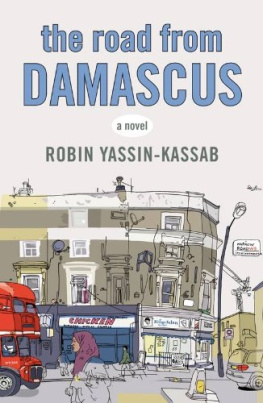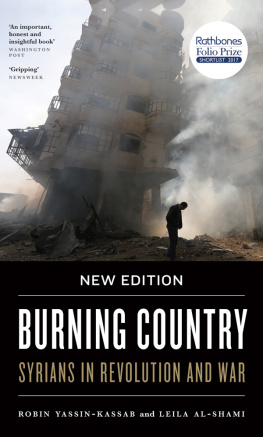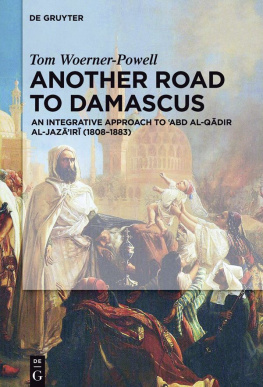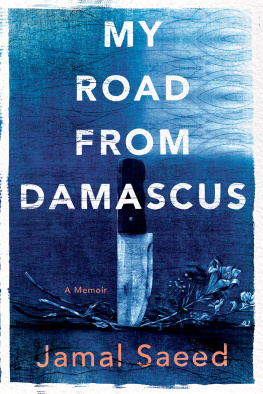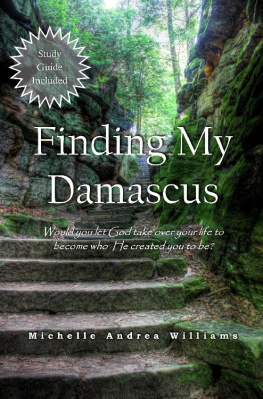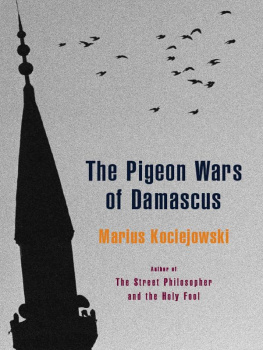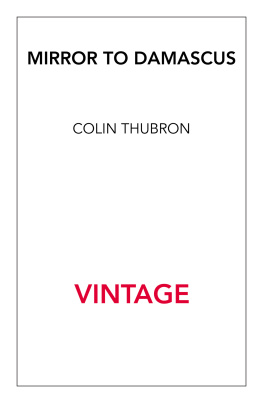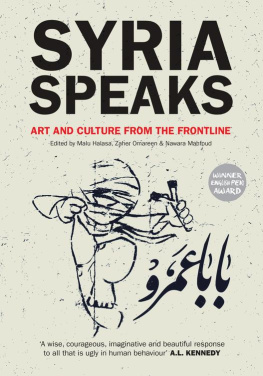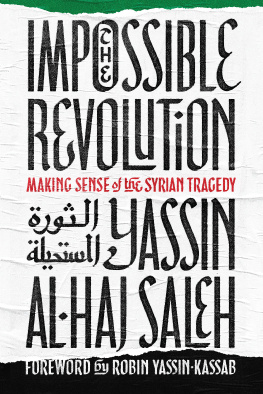Robin Yassin-Kassab - The Road from Damascus
Here you can read online Robin Yassin-Kassab - The Road from Damascus full text of the book (entire story) in english for free. Download pdf and epub, get meaning, cover and reviews about this ebook. year: 2008, publisher: ePenguin, genre: Detective and thriller. Description of the work, (preface) as well as reviews are available. Best literature library LitArk.com created for fans of good reading and offers a wide selection of genres:
Romance novel
Science fiction
Adventure
Detective
Science
History
Home and family
Prose
Art
Politics
Computer
Non-fiction
Religion
Business
Children
Humor
Choose a favorite category and find really read worthwhile books. Enjoy immersion in the world of imagination, feel the emotions of the characters or learn something new for yourself, make an fascinating discovery.
- Book:The Road from Damascus
- Author:
- Publisher:ePenguin
- Genre:
- Year:2008
- Rating:3 / 5
- Favourites:Add to favourites
- Your mark:
- 60
- 1
- 2
- 3
- 4
- 5
The Road from Damascus: summary, description and annotation
We offer to read an annotation, description, summary or preface (depends on what the author of the book "The Road from Damascus" wrote himself). If you haven't found the necessary information about the book — write in the comments, we will try to find it.
The Road from Damascus — read online for free the complete book (whole text) full work
Below is the text of the book, divided by pages. System saving the place of the last page read, allows you to conveniently read the book "The Road from Damascus" online for free, without having to search again every time where you left off. Put a bookmark, and you can go to the page where you finished reading at any time.
Font size:
Interval:
Bookmark:

HAMISH HAMILTON
an imprint of
PENGUIN BOOKS
HAMISH HAMILTON
Published by the Penguin Group
Penguin Books Ltd, 80 Strand, London WC2R 0RL , England
Penguin Group (USA) Inc., 375 Hudson Street, New York, New York 10014, USA
Penguin Group (Canada), 90 Eglinton Avenue East, Suite 700, Toronto, Ontario, Canada M4P 2Y3
(a division of Pearson Penguin Canada Inc.)
Penguin Ireland, 25 St Stephens Green, Dublin 2, Ireland
(a division of Penguin Books Ltd)
Penguin Group (Australia), 250 Camberwell Road, Camberwell, Victoria 3124, Australia
(a division of Pearson Australia Group Pty Ltd)
Penguin Books India Pvt Ltd, 11 Community Centre, Panchsheel Park, New Delhi 110 017, India
Penguin Group (NZ), 67 Apollo Drive, Rosedale, North Shore 0632, New Zealand
(a division of Pearson New Zealand Ltd)
Penguin Books (South Africa) (Pty) Ltd, 24 Sturdee Avenue, Rosebank, Johannesburg 2196, South Africa
Penguin Books Ltd, Registered Offices: 80 Strand, London WC2R 0RL , England
www.penguin.com
First published 2008
1
Copyright Robin Yassin-Kassab, 2008
The moral right of the author has been asserted
The permissions on p. 350 constitute an extension of this copyright page
All rights reserved
Without limiting the rights under copyright
reserved above, no part of this publication may be
reproduced, stored in or introduced into a retrieval system,
or transmitted, in any form or by any means (electronic, mechanical,
photocopying, recording or otherwise), without the prior
written permission of both the copyright owner and
the above publisher of this book
978-0-14-191851-8
For Rana Zaitoon
It is only when you know the Higher Factor that you will know the true situation of the present religions and of unbelief itself. And unbelief itself is a religion with its own form of belief.
Ahmad Yasavi
Atheism indicates strength of mind, but only up to a certain point.
Pense 157 , Pascal
The Other Path
Uncle Mazen drove Sami into the city as far as the parliament building, then shrugged and peered out through the windscreen. The car wouldnt make it up there, he said, pointing an ear at the mountainside. There arent any roads anyway. Just steps. Perhaps you can walk.
Sami disembarked and straightened on the pavement. A man of average height, somewhat hunched, with a pale complexion, a sensitive, moving face, black eyes flashing with an intensity called beautiful by those that love him, and thick and curling hair, also black, grown longer than in his youth to distract from climbing baldness. Still handsome. But a body ageing quickly, increasingly swell-bellied. Thirty-one years old.
And feeling foreign now, unsteady in the heat, among balloon salesmen, bootblacks, cassette stalls, exhaust fumes. Sami searching for breath in the smothered heart of Damascus, home of his ancestors, the former city of streams and orchards the Prophet had refused to enter, not wishing to commit the sin of believing himself in Paradise. But Sami, unconcerned with Paradise, for better or worse, had entered. Damascus was supposed to offer him answers.
Hed been here for a month, in order to (he listed): reconnect with his roots; remember who he was; find an idea. And the tourist stuff too: to bathe in the wellsprings of the original city, the oldest continuously inhabited city on earth. A city that had briefly ruled the world. Wherejasmine and honeyed tobacco scented the evening air. Where Ibn Arabi wrote his last mystical poetry, where Nizar Qabbani wrote Bread, Hashish and Moon.
Years ago Sami thought he would write a doctoral thesis on Qabbani. Not thought; assumed. It had seemed inevitable, and it had never happened. Nothing remained of whatever that idea had been. So he was here to find a new idea, gather material and then return home, write the thesis, become Dr Sami Traifi. As a proper academic, like his father before him, hed be able to get it all back on course, his place in the world, his marriage, his mother. So he believed. A new idea, a turned leaf. It was time, it was perhaps his last chance, to leave childish things behind.
In front of him the mountain was sandy red and imposing, shiny with whitewashed shacks and satellite dishes. One of those buildings, his maternal aunt Fadyas house, was his destination. To his right as he walked there was the rubble of destroyed four-storey Ottoman homes: tangled wood and plaster and a back wall still intact with a mosaic of dead rooms printed on its surface. You could make out the hitherto private squares of paint, entire inescapable universes for their inhabitants, now brought borderless into promiscuous intimacy. On one patch there was some religious calligraphy. On another, what looked like family photographs. Though the demolition was some days old, white dust motes swirled thickly. History refusing gravity.
Just about all the women Sami could see were wearing the hijab, many more than on his last visit. He didnt like it. He didnt like supernaturalism, nor backwardness in general. And in this country a return to religion meant a return to sect. It was just under the surface, just under the smiling face of this hospitable people, the secret loathing of the other path. They dont respect each other, Sami thought. They fear the strong and despise the weak. This cacophonous country: each individual playing from his own score, ignoring the others. But it was his country too. His fathers country.
Struggling upwards against the descending swell of well-wrapped ladies, across Corncob Square with its melancholic bronze president, Sami imagined roadblocks, men with armbands and guns and armed identities. Thats what it could be like, very easily. The wrong identity would end you at the intersection. Dead for wearing a cross. Dead for wearing a hijab. Dead for Alis sword swinging from your car mirror. It had nearly happened in the eighties when the Muslim Brothers took over the city of Hama, and the government had stopped it, rightly. In the face of the Brothers fanaticism the government stood unwaveringly firm. Samis father, Mustafa, safe in London, had explained it to him. Beards disappeared. Surely a good thing. The headscarf tide was reversed. Hair breathed freely. What rational person would disagree with that?
And as he bobbed past coffee merchants, past careening taxis and minibuses, past a line of shawarma furnaces flaring the afternoon into more surreal heat, he asked himself what his father would think if he could see this determinedly Muslim population, hairy and hijabbed not twenty years after the Hama events. What would his father say? It would represent the very end of the world hed hoped for.
Back in London, Samis own wife was threatening to wear the hijab, which somehow seemed to represent the end of everything Sami had hoped for too.
The road stopped as Uncle Mazen had said it would. Up here mucky children replaced traffic, children loud as traffic, smudge-eyed, tangle-haired, brandishing bleeping plastic weaponry. There was the occasional fruitless mulberry tree. The ground was dust, mud where something had spilt. In the winter it would all be mud. Mud and dust alternating, flesh and bone, life and death.
He breathed outside Fadyas wooden door, then swung the knocker. Fadya opened up with a show of surprise and welcomed him, thanked God for his safety, told him he had illumined her house. Her family crowded around him, everybody kissing solemnly and shaking hands. Fadya welcomed him again. Her hair was collected under a white scarf which she didnt remove, despite her blood relationship to Sami, even after the door was shut. His two cousins asked him dutifully for his news, and asked him to make himself at home, following the formulas. Then they sat on the floor in front of the TV, their large backs to him, their lined and stubbled faces immobile.
Font size:
Interval:
Bookmark:
Similar books «The Road from Damascus»
Look at similar books to The Road from Damascus. We have selected literature similar in name and meaning in the hope of providing readers with more options to find new, interesting, not yet read works.
Discussion, reviews of the book The Road from Damascus and just readers' own opinions. Leave your comments, write what you think about the work, its meaning or the main characters. Specify what exactly you liked and what you didn't like, and why you think so.

